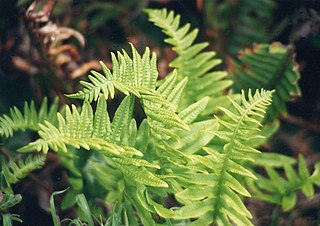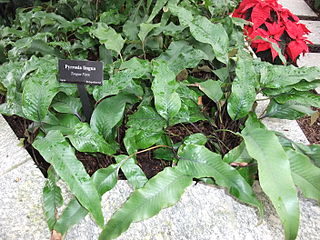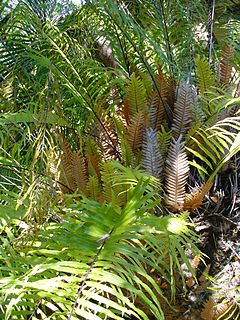
Platycerium is a genus of about 18 fern species in the polypod family, Polypodiaceae. Ferns in this genus are widely known as staghorn or elkhorn ferns due to their uniquely shaped fronds. This genus is epiphytic and is native to tropical and temperate areas of South America, Africa, Southeast Asia, Australia, and New Guinea.

The order Polypodiales encompasses the major lineages of polypod ferns, which comprise more than 80% of today's fern species. They are found in many parts of the world including tropical, semitropical and temperate areas.

Polypodiaceae is a family of ferns. In the Pteridophyte Phylogeny Group classification of 2016, the family includes around 65 genera and an estimated 1,650 species and is placed in the order Polypodiales, suborder Polypodiineae. A broader circumscription has also been used, in which the family includes other families kept separate in PPG I. Nearly all species are epiphytes, but some are terrestrial.

Davallia is a genus of about 40 species of fern. In the Pteridophyte Phylogeny Group classification of 2016, it is the only genus in the family Davalliaceae, which is placed in the suborder Polypodiineae, order Polypodiales. Alternatively, the family may be placed in a very broadly defined family Polypodiaceae sensu lato as the subfamily Davallioideae.

Aglaomorpha fortunei, commonly known as gu-sui-bu, is a species of basket fern of the family Polypodiaceae. The plant is native to Eastern Asia, including eastern China.

Aglaomorpha is a genus of tiger moths in the family Erebidae.

Zealandia pustulata, synonym Microsorum pustulatum, is a species of fern within the family Polypodiaceae.

Campyloneurum angustifolium is a fern species in the family Polypodiaceae, commonly known as narrow strapfern or narrow-leaf strap fern.

Pyrrosia lingua is a species of epiphytic fern in the family Polypodiaceae. It occurs through China, Southeast Asia and into Japan and Taiwan, China. Pyrrosia lingua is grown as a cultivated plant, and multiple named cultivars have been developed.

Aglaomorpha novoguineensis is a species of ferns in the family Polypodiaceae. It is native to New Guinea.

Microsoroideae is a subfamily in the fern family Polypodiaceae in the Pteridophyte Phylogeny Group classification of 2016 (PPG I). The subfamily is also treated as the tribe Microsoreae within a very broadly defined family Polypodiaceae sensu lato. In either treatment, it includes the previously separated tribe Lepisoreae.
Philodoria marginestrigata, the ilima leaf miner, is a moth of the family Gracillariidae. It was first described by Lord Walsingham in 1907. It is endemic to the Hawaiian islands of Nihoa, Kauai, Oahu, Molokai and Hawaii.

Aglaomorpha is a genus of ferns in the subfamily Drynarioideae of the family Polypodiaceae. The Pteridophyte Phylogeny Group classification of 2016 uses this genus name, while other sources use Drynaria to include Aglaomorpha. Species are commonly known as basket ferns. As circumscribed in PPG I, the genus contains around 50 species.

Polypodioideae is a subfamily belonging to the fern family Polypodiaceae, which is a member of the suborder Polypodiineae in the Pteridophyte Phylogeny Group classification of 2016 (PPG I). Alternatively, the subfamily may be treated as the tribe Polypodieae within a very broadly defined family Polypodiaceae sensu lato.
Aglaomorpha is the generic name of two groups of organisms. It can refer to:

Aglaomorpha histrio is a moth of the family Erebidae first described by Francis Walker in 1855. It is found in Korea, Japan, China and Taiwan.
Drynarioideae is a subfamily of the fern family Polypodiaceae in the Pteridophyte Phylogeny Group classification of 2016 (PPG I). The subfamily is also treated as the tribe Drynarieae within a very broadly defined family Polypodiaceae sensu lato. In either case, it includes the previously separated tribe Selligueeae.

Dendrocnide meyeniana or the poisonous wood nettle is a species of tree in the family Urticaceae, native to the thickets and secondary forests of Taiwan and the Philippines. It is called Bazyuru in Taiwan. It is commonly referred to as the lipa tree, but more specifically lipang kalabaw or, more rarely, apariagua. The plant is named bulan-bulan in the Iloilo province and other areas with Bisayan languages.

Aglaomorpha quercifolia, commonly known as the oakleaf fern or oakleaf basket fern, is a species of Aglaomorpha in the family Polypodiaceae. Other common names for the fern are pakpak lawin, gurar, koi hin, ashvakatri, kabkab, kabkaban, or uphatkarul.
Paragramma is a genus of ferns in the family Polypodiaceae, subfamily Microsoroideae according to the Pteridophyte Phylogeny Group classification of 2016 (PPG I). There is a single species, Paragramma longifolia. Other sources do not accept the genus, submerging it into Lepisorus, with Paragramma longifolia becoming Lepisorus longifolius(Blume) Holttum. A molecular phylogenetic study in 2019 showed that Lepisorus longifolius was sister to all the remaining species of Lepisorus, which formed a clade.















